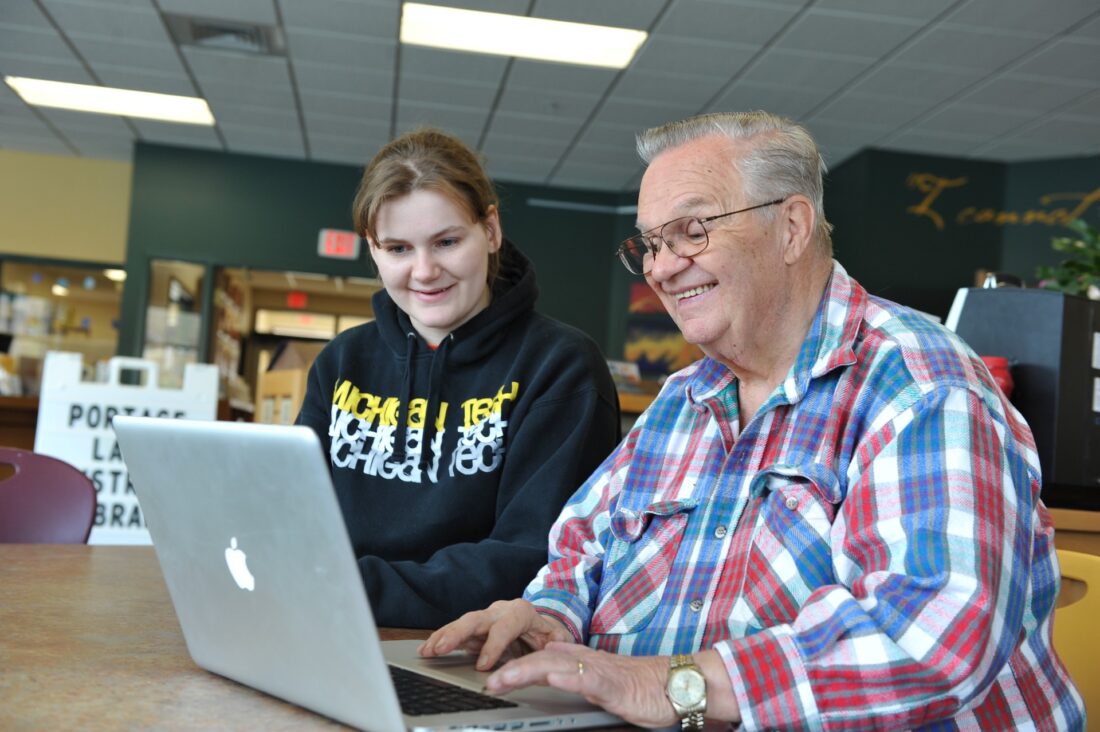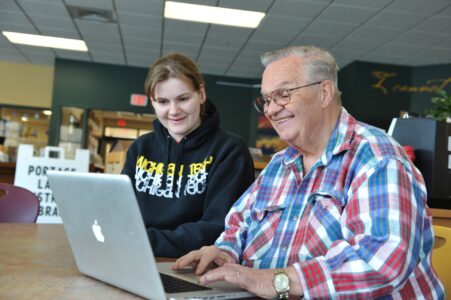Lending a helping hand
Tech students offer tech help

A Michigan Tech student helps a man with his laptop at the Portage Lake District Library. (Photo courtesy of Charles Wallace)
HOUGHTON — Michigan Tech student volunteers will offer adults assistance with technological issues with their mobile devices and computers and will hold two informational workshops free of charge as part of Digital Help Day Saturday, Dec. 6 at the Portage Lake District Library. The students are made up of BASIC volunteers and those in the Essential Education Experience Course on Digital Tutor Training. The course has students applying knowledge they learn in the subject of computing and apply that knowledge in assisting community members. The students are under instruction by Professor of Computer Science Charles Wallace and Psychology and Human Factors Assistant Professor Kay Tislar.
The BASIC event will run from 10 a.m. to noon, where the students will answer any questions attendees have about their mobile devices or computers. Attendees can bring devices which are not working properly to have them inspected or new devices they would like to learn more about. They can also ask the students about the capability of the devices and learn about functions they may not be aware of and how to utilize them.
According to Wallace, one of the issues people seem to have is being locked out of their devices. “So we have helped them recover accounts, but sometimes they have questions like, ‘I’ve heard about storing data on the cloud. Can you tell me about what the cloud is all about?’ Those are more kind of like informational questions, and we’re happy to help people with that, and kind of guide them,” Wallace said.
Though the BASIC workshop will begin Digital Help Day, it will also be available at the PLDL once a month for the duration of the spring 2026 semester. Wallace said those interested should check with the library for future BASIC workshop dates.
The first student-led informational workshop, AI: Opportunities and Risks, will run from 11 a.m. to 12:30 p.m. and go over opportunities AI presents to people and how it can be utilized in a productive way. The presentation will also go over AI’s flaws and ways in which it can not be entirely relied upon.
“They’re also going to talk about some of the risks about it, because we know the AI systems are not perfect, and they hallucinate, and they make all kinds of mistakes,” Wallace explained. “So we’re going to kind of talk about the pros and the cons of AI technology.”
This workshop is a first for the students, who worked together researching AI’s capabilities.
The last student-led informational workshop is called Digital Privacy: How to Protect It. The workshop runs from 1 p.m. to 2:30 p.m. and revolves around keeping private information enclosed to the user while working online. The presentation will instruct attendees how to pick up on phishing attempts and other techniques scammers use to obtain protected information from internet users.
“One of the big signs of a scam is when outside people ask you for particular kinds of information that should absolutely remain private. So you should have a good sense of what is shareable and what should not be shared online. I think this is a real goal of what we’re trying to do,” Wallace said.
The students provide the assistance and education to the attendees as part of their course, though Wallace emphasized the students enjoy providing assistance to the community and learning how to appreciate technology from a different perspective.
“What the students in that course and also the volunteers get is a tremendous amount of experience looking at technology in a different way from the way they are accustomed to,” he said. “A lot of Michigan Tech students are very comfortable with digital technology, but it’s really important for them to get perspective of someone who hasn’t had a lot of experience with it and maybe feels a little anxious or even frightened by it, and understand that perspective, and think about how to help people who are in that kind of situation figure out ways to explain things that make sense to them. You can’t use a lot of fancy language like they are talking to another student who also feels comfortable with technology.”
Wallace explained students will need to think about questions and assumptions about problems presented at BASIC and the presentations and plan for how they can provide assistance to the attendees, which will build up communication skills for the general public.






